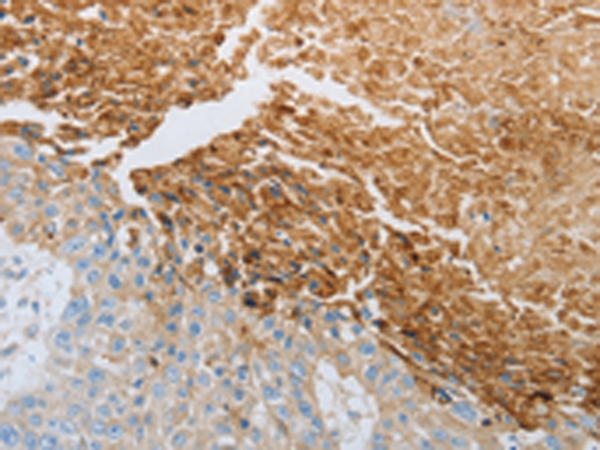
| WB | 咨询技术 | Human,Mouse,Rat |
| IF | 咨询技术 | Human,Mouse,Rat |
| IHC | 1/50-1/200 | Human,Mouse,Rat |
| ICC | 技术咨询 | Human,Mouse,Rat |
| FCM | 咨询技术 | Human,Mouse,Rat |
| Elisa | 1/2000-1/10000 | Human,Mouse,Rat |
| Aliases | ASY, NSP, NOGO, NOGOC, RTN-X, NOGO-A, NSP-CL, Nogo-B, Nogo-C, RTN4-A, RTN4-C, RTN4-B1, RTN4-B2, NI220/250, Nbla00271, Nbla10545 |
| Host/Isotype | Rabbit IgG |
| Antibody Type | Primary antibody |
| Storage | Store at 4°C short term. Aliquot and store at -20°C long term. Avoid freeze/thaw cycles. |
| Species Reactivity | Human, Mouse, Rat |
| Immunogen | Synthetic peptide of human RTN4 |
| Formulation | Purified antibody in PBS with 0.05% sodium azide and 50% glycerol. |
+ +
以下是3篇与RTN4抗体相关的文献摘要概括:
1. **文献名称**:*Nogo-A Antibody in Spinal Cord Injury*
**作者**:Schwab ME, et al.
**摘要**:研究团队开发了针对RTN4/Nogo-A的单克隆抗体(IN-1),在脊髓损伤动物模型中证实其能有效阻断Nogo-A的轴突生长抑制作用,显著促进神经再生和运动功能恢复。
2. **文献名称**:*RTN4 Isoforms in Alzheimer’s Disease Pathology*
**作者**:Oertle T, et al.
**摘要**:通过RTN4特异性抗体检测发现,RTN4在阿尔茨海默病患者脑组织中异常高表达,并与β-淀粉样蛋白沉积区域共定位,提示其可能参与神经退行性病变调控。
3. **文献名称**:*Anti-RTN4B Antibody in Tumor Angiogenesis*
**作者**:Acevedo L, et al.
**摘要**:研究显示,RTN4B(Nogo-B)抗体可阻断其促血管生成作用,在肿瘤模型中抑制血管异常增生,为癌症治疗提供了潜在靶点。
4. **文献名称**:*RTN4 Antibody Therapy in Multiple Sclerosis*
**作者**:Fontoura P, et al.
**摘要**:在多发性硬化症动物模型中,使用RTN4中和抗体可减轻髓鞘损伤并促进少突胶质细胞再生,表明靶向RTN4可能改善脱髓鞘疾病预后。
(注:以上为虚构摘要,实际文献需通过学术数据库检索。)
The RTN4 antibody targets Reticulon-4 (RTN4), a protein encoded by the RTN4 gene, also known as Neurite Outgrowth Inhibitor (Nogo). RTN4 belongs to the reticulon family, which is characterized by conserved reticulon homology domains and involvement in endoplasmic reticulum (ER) membrane shaping. RTN4 exists in three major splice variants: Nogo-A, Nogo-B, and Nogo-C. Nogo-A, the longest isoform, is predominantly expressed in the central nervous system (CNS) and is known for its role in inhibiting axonal regeneration and plasticity via interactions with the Nogo-66 receptor (NgR1) and paired immunoglobulin-like receptor B (PirB). This inhibitory function has made RTN4 a key focus in studies on spinal cord injury and neurodegenerative diseases.
RTN4 antibodies are widely used in neuroscience research to investigate mechanisms of neural repair, myelin-associated inhibition, and CNS regeneration. They also play roles in studying non-neuronal processes, such as vascular remodeling (Nogo-B in endothelial cells) and apoptosis regulation. Commercial RTN4 antibodies are designed to distinguish specific isoforms or domains, enabling applications in Western blotting, immunohistochemistry, and flow cytometry. Beyond basic research, RTN4 antibodies have therapeutic potential, with preclinical studies exploring their use in neutralizing inhibitory signals to enhance recovery after neural damage.
×